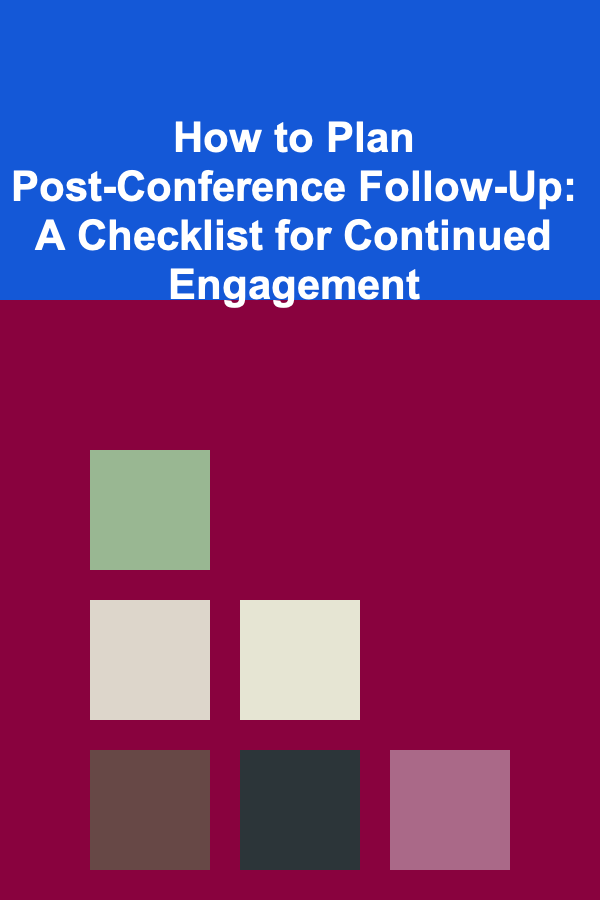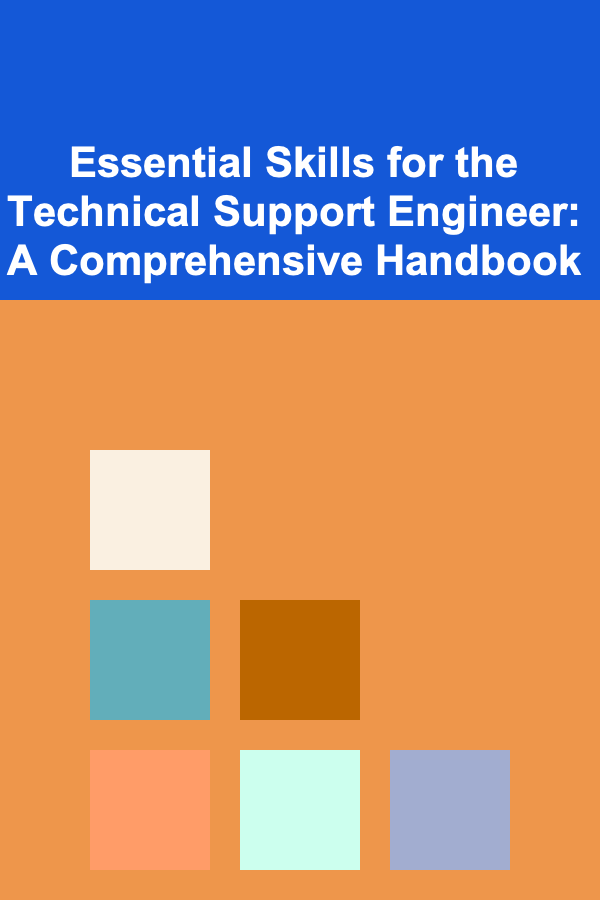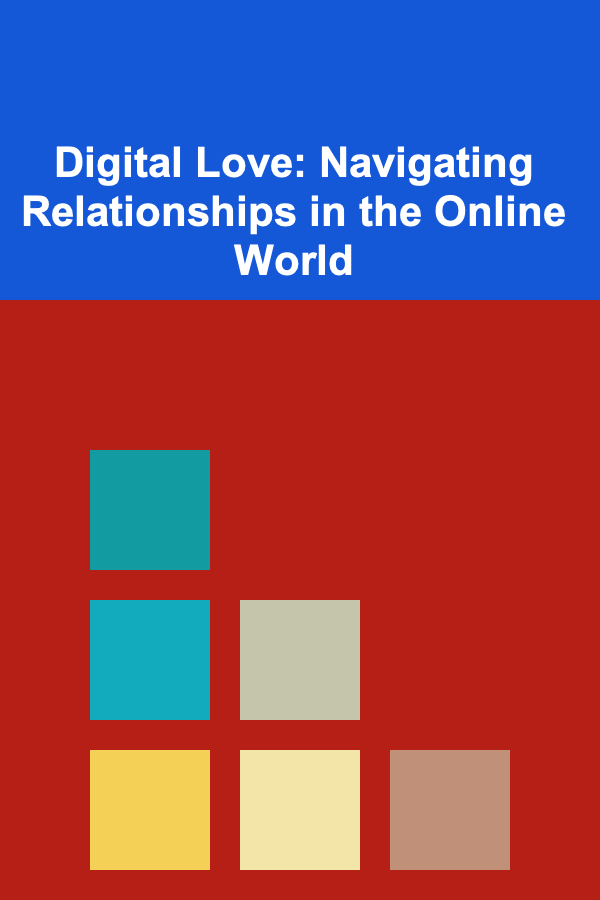
How to Plan Post-Conference Follow-Up: A Checklist for Continued Engagement
ebook include PDF & Audio bundle (Micro Guide)
$12.99$10.99
Limited Time Offer! Order within the next:

Attending a conference can be an enriching experience filled with learning, networking, and new opportunities. However, what happens after the conference is just as important as the event itself. Effective post-conference follow-up can help you capitalize on the connections you've made, reinforce your professional presence, and create lasting relationships. This article will provide you with an actionable guide to ensure your post-conference follow-up is thorough, strategic, and beneficial for continued engagement.
Organize Your Notes and Materials
After the conference, your first step should be to organize the information and materials you've collected. Whether you attended workshops, panels, or keynote speeches, reviewing and categorizing your notes will ensure you don't forget valuable insights.
Actionable Steps:
- Review Your Conference Notes: Go through your notes and highlight key takeaways, ideas you want to explore further, or actions you intend to take. This review will help you set a clear agenda for follow-up.
- Organize Your Materials: If you received any brochures, business cards, or other handouts, sort them by relevance. Consider scanning or digitizing them for easy access later.
- Consolidate Conference Resources: If the conference shared resources like session recordings, slides, or research papers, gather these for reference. Revisit them to deepen your understanding or to remind yourself of useful content.
Follow Up With Contacts and Connections
One of the primary reasons for attending conferences is to network, and post-conference follow-up is essential to turning brief interactions into meaningful relationships.
Actionable Steps:
-
Prioritize Your Contacts: Sort through the business cards or contact lists you collected and prioritize your connections based on how relevant they are to your professional goals.
-
Send Personalized Follow-up Emails: Within 24-48 hours, send a brief but personalized email to those you connected with. Reference your conversation at the conference to remind them of who you are. Keep it polite and professional, with a clear call to action (e.g., scheduling a meeting, sharing resources, or collaborating on a project).
Example Template:
Dear [Name], It was a pleasure meeting you at the [Conference Name]. I enjoyed our conversation about [specific topic] and would love to continue our discussion. If you're open to it, I'd appreciate the opportunity to connect further or set up a time for a virtual coffee chat. Looking forward to hearing from you! Best regards, [Your Name] -
Be Strategic with Your Follow-Up: Not every connection requires an immediate deep follow-up. For example, some connections may be more relevant for future collaborations, while others may need more immediate attention. Tailor your follow-up based on the significance of the relationship.
Leverage Social Media for Continued Engagement
In today's digital world, social media is a powerful tool for building and maintaining professional relationships. Post-conference is the perfect time to leverage your social media platforms to stay engaged with people you met.
Actionable Steps:
- Connect on LinkedIn: Send personalized LinkedIn connection requests to individuals you met at the conference. Remind them of your conversation and share a brief message about why you're connecting.
- Engage with Posts and Content: If your conference had a hashtag or social media activity, engage with it. Like, comment, and share relevant content that relates to your interests or professional goals.
- Join Industry Groups: Many conferences also have groups or forums for attendees to continue discussions. Join these online communities to maintain engagement and deepen your connections.
Review and Apply the Knowledge Gained
The conference itself is only half of the equation---what you do with the knowledge you gain is just as critical. A well-planned post-conference strategy should include taking action based on the insights, tools, and resources you've gathered.
Actionable Steps:
- Implement New Ideas and Strategies: If you attended workshops or presentations that offered strategies, tools, or methodologies, put them into practice. Identify how these ideas can be applied to your own work or business.
- Create an Action Plan: Write down specific steps that you will take as a result of the conference. This could include setting new goals, adopting new technologies, or researching more on certain topics.
- Share Your Learnings with Your Team: If you attended the conference on behalf of your team or organization, create a summary of your key learnings and share it with others. A debrief session can help translate insights into action within your organization.
Evaluate Your Conference Experience
Before diving into post-conference activities, take a moment to reflect on your experience. This reflection can help you identify areas of improvement for your future conference attendance and also guide your post-conference efforts.
Actionable Steps:
- Assess the Value of the Conference: Reflect on what you learned, who you met, and how the experience will benefit your professional growth. This evaluation will help you decide whether the conference was worth your time and investment.
- Identify Improvement Areas: Consider what could have made your experience even better. Was there something missing in the conference format, or did you feel you could have networked more effectively? Use these insights to improve your strategy for future conferences.
Maintain Regular Check-ins and Communication
Sustaining relationships over the long term requires ongoing communication. After your initial follow-up, you should continue to nurture the connections you've made to ensure your professional network remains strong.
Actionable Steps:
- Set Reminders for Check-ins: Schedule periodic follow-ups with your new connections to stay engaged. This doesn't have to be constant; a quarterly check-in or sending a relevant article or industry update can keep the relationship active.
- Provide Value: When following up, always aim to offer value. Whether it's sharing an interesting article, introducing them to another connection, or suggesting a relevant event or webinar, continuing to provide value strengthens your relationship and ensures mutual benefit.
- Join Post-Conference Events: Many conferences host follow-up webinars, meetups, or networking events after the main event. Participate in these to continue building on the relationships you've started.
Track and Measure Your Results
Effective post-conference follow-up isn't just about sending emails or making phone calls---it's also about tracking the outcomes of these efforts. Measuring your success helps you refine your strategy for future conferences.
Actionable Steps:
- Track Responses and Engagement: Monitor the responses to your emails, LinkedIn messages, and social media interactions. Keep a log of who responded, who you were able to connect with, and any significant outcomes from the interactions.
- Measure Impact on Your Goals: Review the connections you've made and see how they align with your goals. Are you collaborating on new projects, gaining referrals, or expanding your professional network? Measuring these results helps you understand the true value of the conference.
- Refine Your Follow-Up Process: Based on your results, make adjustments to your follow-up strategy. Perhaps you need to follow up sooner, or maybe you should alter the way you engage with different types of contacts.
Plan for Future Conferences
Now that you've learned how to manage post-conference engagement, you can start preparing for future events with the knowledge of what works and what doesn't.
Actionable Steps:
- Start Early: Begin your preparation for future conferences by researching relevant events early and setting clear goals for each one. Think about how you want to engage with speakers, exhibitors, and other attendees.
- Refine Your Networking Approach: With each conference you attend, you'll improve your ability to network effectively. Use past experiences to guide your approach and refine your goals for future events.
Conclusion
Post-conference follow-up is critical for turning fleeting interactions into meaningful, long-lasting professional relationships. By organizing your materials, following up with contacts, leveraging social media, applying your learnings, and maintaining regular engagement, you can ensure that the value of your conference experience extends well beyond the event itself. With strategic, thoughtful follow-up, you'll maximize the impact of every conference you attend and build a network that will support your career growth for years to come.
Reading More From Our Other Websites
- [Personal Care Tips 101] How to Choose a Foundation for a Full Coverage, Glam Look
- [Personal Investment 101] How to Balance Stocks, Bonds, and Other Investments for Optimal Growth
- [Home Security 101] How to Make Your Home More Secure When Moving In
- [Home Pet Care 101] The Best Bedding for Your Small Pet's Cage
- [Tie-Dyeing Tip 101] Essential Tie-Dye Supplies: A Beginner's Checklist
- [Tie-Dyeing Tip 101] Best Tie‑Dye Color Palettes for Neon Festival Outfits
- [Home Rental Property 101] How to Reduce Tenant Turnover and Keep Your Rental Profitable
- [Personal Care Tips 101] How to Make Your Lipstick Go Further: Tips for Maximizing Use
- [Mindful Eating Tip 101] Taste the Tranquility: Science-Backed Benefits of Mindful Eating on Stress Levels
- [Personal Investment 101] How to Unlock The Power of Compounding to Grow Your Wealth Faster

Essential Skills for the Technical Support Engineer: A Comprehensive Handbook
Read More
How to Build a Checklist for Market Segmentation Analysis
Read More
How to Store Herbs and Spices for Maximum Flavor
Read More
How to Understand Craft Beer Sensory Analysis
Read More
How to Develop AI for Sports Analytics
Read More
Digital Love: Navigating Relationships in the Online World
Read MoreOther Products

Essential Skills for the Technical Support Engineer: A Comprehensive Handbook
Read More
How to Build a Checklist for Market Segmentation Analysis
Read More
How to Store Herbs and Spices for Maximum Flavor
Read More
How to Understand Craft Beer Sensory Analysis
Read More
How to Develop AI for Sports Analytics
Read More